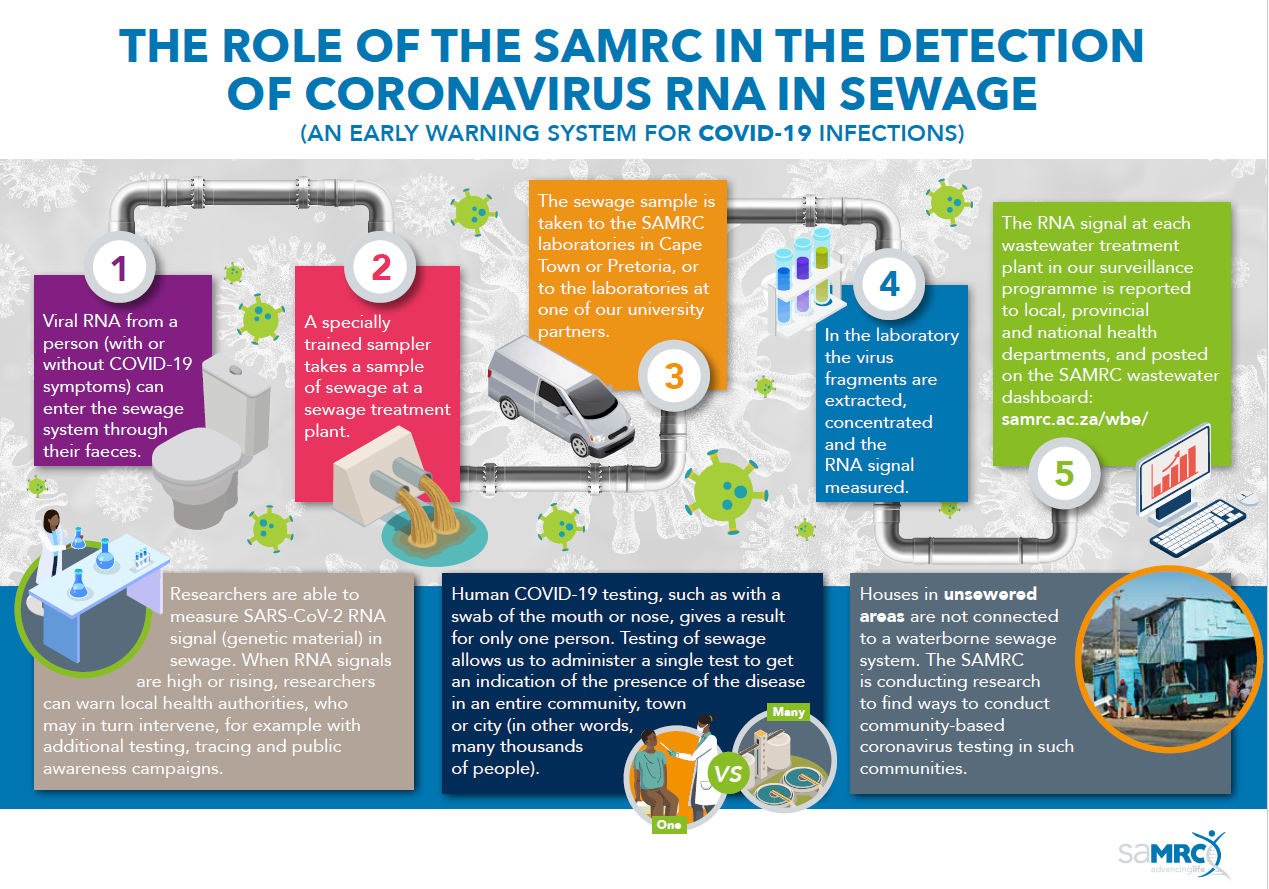SAMRC colleagues in discussion during a visit to UCT Future Water Hub in Franschhoek.
Wastewater-based epidemiology can play a vital role in pandemic preparedness
Wastewater-based epidemiology is a method of monitoring the health of a community through the analysis of wastewater (sewage) samples collected in a particular catchment area. Scientists are able to test wastewater for the genetic remains of viruses and bacteria, as well as the concentrations of chemicals such as toxic metals, illicit substances and pharmaceuticals. When wastewater is tested regularly, it is possible to detect patterns in, for example, the levels of viruses or other pathogens, or an increase in the use of drugs to treat ill-health conditions such as diabetes or hypertension. Because a single sample can give valuable insights into the overall health of the community in a catchment area, wastewater surveillance is also a highly cost-efficient public health monitoring system and has been described as a treasure trove of public health information.
In 2020, driven by the urgent need to support the national effort to combat Covid-19 in South Africa, a group of scientists from the South African Medical Research Council (SAMRC) used wastewater-based epidemiology as a way to detect the rise and spread of Covid-19 infections in South Africa. The non-infectious SARS-CoV-2 RNA is shed in the faeces of people with Covid-19, whether they are symptomatic or asymptomatic. Through weekly wastewater testing, the SAMRC team was able to measure the SARS-CoV-2 RNA signal in wastewater samples collected from more than 80 wastewater treatment facilities across six provinces in South Africa. The team was also able to detect or track the emergence of new SARS-CoV-2 variants, such as the Delta and Omicron variants that caused waves of infection in South Africa.
Information generated through the SAMRC wastewater surveillance and research programme (WSARP) was used to immediately alert participating municipalities of increases in concentrations of SARS-CoV-2 RNA and warn the National Department of Health of emerging “hotspots”, thereby creating a valuable early warning system, and an important contribution to pandemic preparedness. Members of the public were also able to obtain the results through an interactive online dashboard.
Partnerships are a crucial element of the success of the SAMRC wastewater surveillance and research programme, and invaluable roles are played by multiple teams within the SAMRC, university-based laboratory partners, and public health stakeholders. As the programme grows and continues to flourish, it has attracted international attention, and established international research collaborations with researchers in, for example, the UK, the US and Nigeria. The wastewater programme also enables significant capacity development in historically disadvantaged institutions, through training programmes, technical support and equipment grants, and the infrastructure for wastewater surveillance in South Africa is now significantly greater than prior to the Covid-19 pandemic.
Preparing for future pandemics
With the World Health Organization (WHO) determining that Covid-19 is now an established and ongoing health issue, the SAMRC wastewater surveillance and research programme has been repurposed to create opportunities to explore other health concerns. For example, wastewater continues to be tested on a weekly basis, but now for an expanded list of pathogens, for example cholera and monkeypox, and also to investigate the occurrence of bacteria that are resistant to currently available antibiotics.
Addressing antimicrobial resistance (AMR) is crucial, as it poses a significant threat to global health, making infections harder to treat and increasing the risk of disease spread. These monitoring efforts are an important basis for pandemic prevention, preparedness and response in South Africa. As demonstrated during the Covid-19 pandemic, wastewater-based epidemiology can play a vital role in pandemic preparedness by providing early detection and monitoring of antimicrobial resistance in communities, enabling timely interventions to protect public health.

The South African Medical Research Council (SAMRC) plays a crucial role in the monitoring of viruses, bacteria and chemicals. By measuring these in wastewater, SAMRC helps local health authorities make timely actions to mitigate the spread of outbreaks.